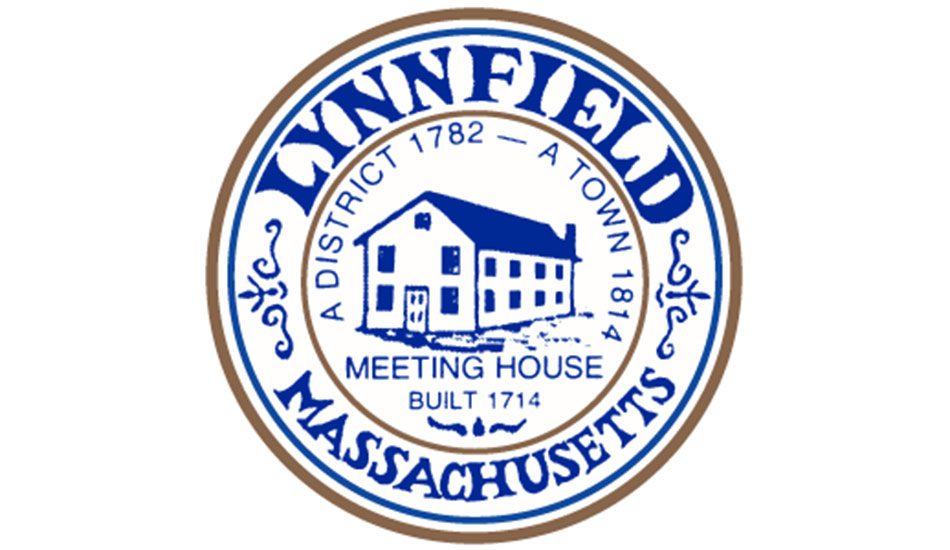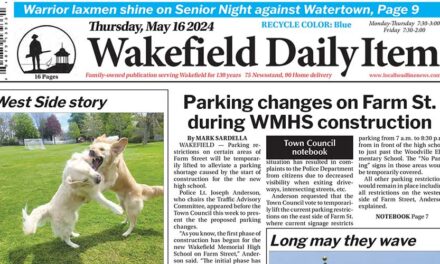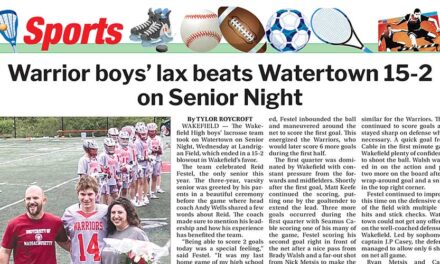By DAN TOMASELLO
LYNNFIELD — The Select Board unanimously voted to form the MBTA Communities Law Committee during Monday’s meeting.
Former Gov. Charlie Baker signed an economic development bill into law in February 2021, which amended the state Zoning Act, by requiring MBTA communities to have at least one zoning district of reasonable size in which multifamily housing is permitted as of right. While the town does not have an MBTA station, the law classifies Lynnfield as an “MBTA adjacent community” because the town borders municipalities with MBTA stations such as Lynn, Peabody, Reading and Wakefield.
Lynnfield is currently classified as being in “interim compliance” after Planning and Conservation Director Emilie Cademartori submitted an action plan to the state early last year.
Select Board Chair Dick Dalton said one of his goals for this year is working toward complying with the MBTA Communities law. He previously stated that he opposes the law.
“We are close to finalizing an agreement with a third-party consultant to assist us with technical compliance issues and public engagement,” said Dalton. “Their services will be entirely funded by the Massachusetts Housing Partnership. I can assure you that this process will be a very transparent exercise. Over the last few weeks, we have had a number of people approach us about this issue and their concern about the 600 units.”
Dalton recalled that Attorney General Andrea Campbell’s lawsuit seeking to force the town of Milton to comply with the MBTA Communities law will go before the Supreme Judicial Court in October. Milton Town Meeting approved a plan that would have complied with the law, but opponents of the changes worried about excess development pursued a referendum. A majority of Milton voters in February chose to spike the compliant zoning plan.
The state swiftly revoked a $140,800 seawall and access improvement grant for Milton, and said the town will be ineligible to receive future MassWorks and HousingWorks grants and will be at a competitive disadvantage when seeking other state funds.
Dalton anticipates that, “The Supreme Judicial Court will rule on this issue before the end of the year.”
“If we are compelled to comply, that doesn’t necessarily mean we have to build 600 units,” said Dalton. “We have to zone for them. I feel comfortable that we will be able to manage this incursion by state government into the affairs of our town with little or no impact on the character of the town. It is our intention to bring this before Town Meeting, but not until the Supreme Judicial Court has ruled.”
While Dalton wants to wait until the Supreme Judicial Court rules on the Milton case, the state previously informed municipalities they have a Dec. 31 deadline to establish a multifamily zoning district.
The MBTA Communities Law Committee consists of Dalton, Planning Board Chair Page Wilkins, Planning Board Vice Chair Kate Flaws, Zoning Board of Appeals Chair Anthony Moccia and Board of Assessors member Richard O’Neil. Taigh McClory will serve as an alternate member. Dalton recommended that Wilkins serve as the MBTA Communities Law Committee’s chair on an interim basis.
“This truly is a planning issue,” said Dalton. “All four other than myself are attorneys. Besides serving on the Select Board, I served 15 years on the Planning Board. Richard O’Neil was chair of the Planning Board for quite awhile.”
Dalton said an internal working group previously met to discuss complying with the MBTA Communities law.
“That working group has been supplemented by Emilie Cademartori, who is our director of planning and conservation, and Town Administrator Rob Dolan,” said Dalton. “Emilie has been drafting up a scope of work for the consultant that will be paid for by the Massachusetts Housing Partnership. We want someone looking at it with expertise other than what we have in-house in terms of technical compliance. They are very familiar with the law.”
Dalton said the state’s guidelines “require a formal plan for public engagement.” He said that is why the Massachusetts Housing Partnership is funding the cost for technical assistance.
“Public outreach and transparency will be evident to all,” said Dalton. “We have to make certain we are doing all that we can to educate the public so they will be informed voters when it is brought before them. It’s a very important part of the law that we have to comply with.”
Select Board member Phil Crawford expressed his support for the new MBTA Communities Law Committee.
“It is certainly a planning process,” said Crawford. “I think it is a very good group for the MBTA Communities Law Committee.”
Dalton said he recommended that the MBTA Communities Law Committee consist of five members instead of a larger body because any potential zoning changes will be a “very technical issue.”
“We are going to have a lot of public outreach and there will be plenty of opportunity for debate and discussion,” said Dalton.
Select Board member Alexis Leahy said she supported the proposed configuration of the MBTA Communities Law Committee.
“It’s good to see the director of planning and conservation as an active member,” said Leahy.
After the discussion, the Select Board unanimously voted to form the MBTA Communities Law Committee.
The Select Board’s vote to form the MBTA Communities Law Committee occurred in the wake of Wakefield Town Meeting rejecting three proposed zoning changes that sought to comply with the law on April 29.
Marshfield Town Meeting also voted last month to reject a proposed zoning change that would have complied with the law. While Wakefield, Milton and Marshfield are not currently complying with the law, the Executive Office of Housing and Livable Communities noted in a press release that 44 communities have passed multifamily zoning changes in order to comply with the MBTA Communities law.
“The overwhelming majority of communities are doing what they can to comply with the law,” said Secretary of Housing and Livable Communities Ed Augustus in the press release. “We are proud to see communities adopt zoning that is intended for compliance with the MBTA Communities law. For far too long, families have been boxed out of our more desirable neighborhoods. And this law will help us create livable communities with housing options for every income.”
— The State House News Service contributed to this report.





